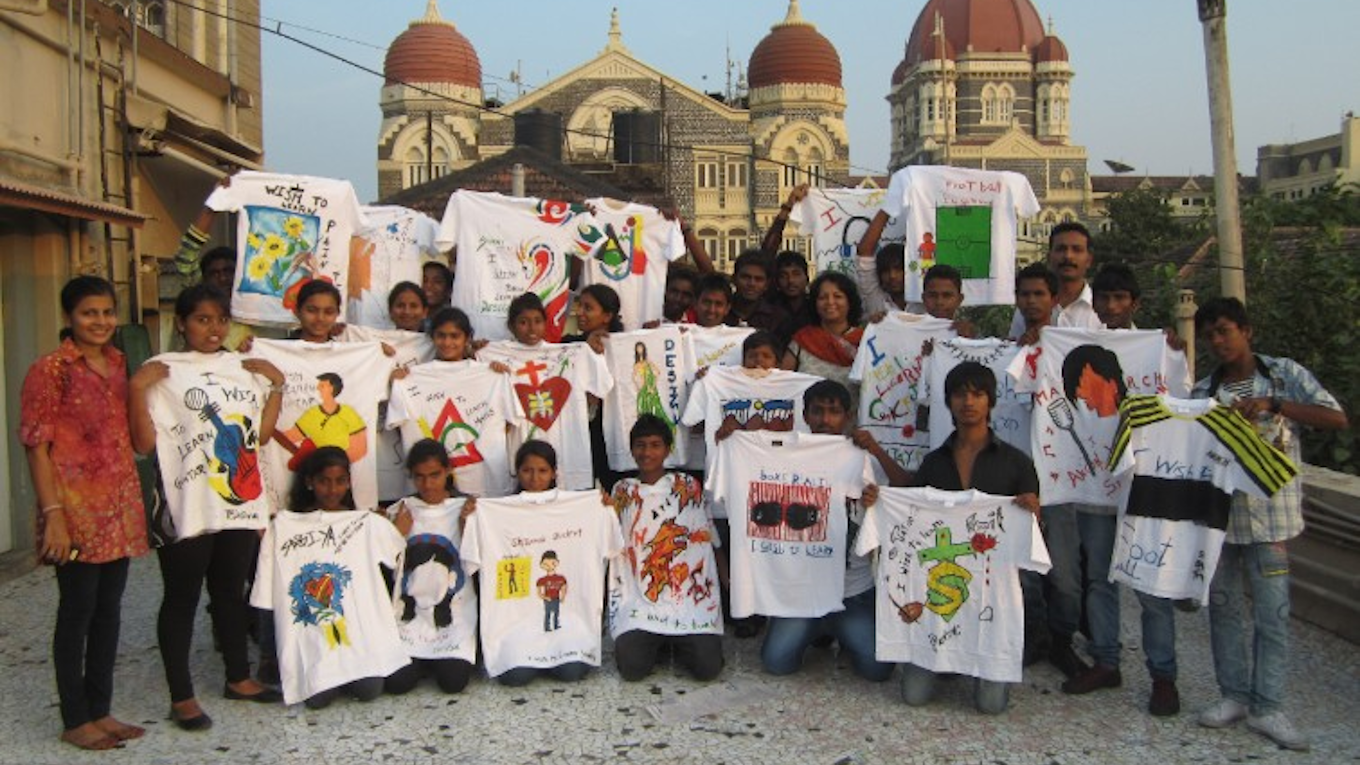-

Group employee volunteers

he private sector today needs to support the government in improving the lives of the underserved through active engagement. Businesses should work to create shared value for both themselves as well as society. While the value created for the business will reflect through the bottom line, the value created in society will reveal itself in an enhancement in the quality of life and the impact it creates through positive development outcomes. My professors at ESSEC Business School (France) taught me why numbers were important to justify business strategy and the importance of cost and profit analysis. But early in my career, I realised the importance of broad basing this understanding of numbers to encompass development objectives and inclusiveness, thereby creating a viable environment for businesses to thrive. It is my strong belief that a modern business needs to go beyond just providing employment to people and the pursuit of profit, and follow a path that can contribute meaningfully to the economic growth of the nation. How does one do that? A choice between charitable CSR activities and an integrated inclusive business strategy is one that all businesses face. Charitable donations are important and do play a role. However, today many companies seek to expand their engagement so that their business models positively impact the well-being of communities while continuing to earn a profit. These companies integrate CSR into their business, amplifying the cause and engaging key stakeholders to make a larger difference. As part of the Tata Group, we have always worked on furthering social inclusion and affirmative action. We are committed to leveraging CSR synergies to build bridges and enable market access for underserved target communities, including to our workforce and value chains. It is about embracing social and environmental responsibility as a part of the way we do business and using that integration to drive economic value. Businesses can help address many developmental challenges by contributing to growth and jobs, reducing poverty, inequity, catalysing positive behaviour change in societies, mitigating climate change, ensuring food security, environmental sustainability and so on. At Indian Hotels Company Ltd (IHCL), a benevolent and inclusive way of doing business has been a part of our DNA since inception. Our founder Jamsetji Tata’s vision of creating a hotel brand that represents the pride and culture of India has guided our social purpose over the last century and continues to inspire us, as we build and execute programmes for the times that lie ahead.
-
In an attempt to further harmonise and unlock the true and transformative potential of our CSR initiatives, we have brought them all together under one umbrella brand: Pathya.
Pathya pays homage to our journey of corporate citizenship and encapsulates our constant endeavour to continue building partnerships and to forge ahead on our path towards creating a better tomorrow. The brand’s endeavour will be to further enable better and more meaningful engagement across all our stakeholders, as well as with the various causes and communities that we serve. Pathya’s areas of focus include contributing to the sustainable welfare of the communities, building livelihoods, extending support towards heritage and tourist spots to enable local cultures, communities and environment to thrive.
Our hotel designs, value chains, cuisines and guest engagement experiences represent local culture and communities and contribute in some form or the other towards the betterment of society. This is reflected in our uniforms sourced directly from traditional artisans; or products like laundry bags, etc, procured from micro-enterprises serving less privileged women and cancer-affected families; or the workforce we train and recruit from identified underserved communities; or our initiatives to optimise energy, water and plastics use or our employee volunteering initiatives. This year IHCL’s corporate responsibility practices were recognized by SKOCH merit awards, ASSOCHAM awards for effective collaboration with Tata Strive and resulted in IHCL being featured on the list of 50 Most Inclusive Businesses in India by the Shared Value Initiative of the Institute for Strategy and Competitiveness, Harvard Business School. IHCL was also recognised by the Indo-German Chamber of Commerce (IGCC) in September 2018 for its Outstanding Contribution towards Best Sustainable Business Practices by a large enterprise.
We have championed the cause of skilling less privileged youth in the country since more than a decade; long before the inception of the CSR mandatory spend under the Companies Act, 2013. It’s a known fact how badly youth at the bottom of the pyramid lack timely guidance and handholding for what they can do post high school to become employable. Our CSR and Affirmative Action efforts have been focused on addressing this gap. We support several Taj-Tata Strive Skill Training Centres, offer the Golden Threshold Programme (GTP): a three-year bachelor’s degree in vocational education in association with the Tata Institute of Social Sciences (TISS) and enable several bridge courses across India to enable less-privileged youth to access the growing jobs in the service industry. Through these initiatives, we have not only been involved in enabling skilling and certification for thousands of school dropout youth from under-served communities and regions but have also offered employment to many who choose to work with us. We not only preserve our own heritage properties, but also, endeavour to preserve and promote natural and cultural heritage around some of our identified locations. We have built partnerships with artisans, weavers and social purpose organizations to promote their artefacts by offering handholding and access to our supply chain and also enable display spaces in our properties to showcase and sell directly to guests, adding value to the guest experience.
-
While providing employment opportunities, the programme also channelises the community’s age-old knowledge in an economically sustainable direction and enables conservation
Our support to Benarasi Weavers’ Programme to endeavours such as ‘Walk with the Pardhis’ near Taj Safaris are collaborations that further inclusive tourism models enabling alternate livelihood opportunities. While providing employment opportunities, the programme also channelises the community’s age-old knowledge in an economically sustainable direction and enables conservation.
Through our Taj Public Service Welfare Trust, we’ve been supporting disaster response across the country at several instances like the recent Kerala & Kodagu floods and provide aid to families affected by 26/11 and subsequent bomb blasts in Mumbai.
In the hospitality sector, the impact of the energy and water consumption, waste creation and disposal on the environment, is taking centre-place in discussions on inclusive business strategies pertaining to environmental sustainability. Phasing out single-use plastic, exploring renewable energy and strengthening water security are IHCL’s initiatives towards environmental stewardship.
Despite individual efforts by many companies, the macro environment challenge remains in compounding disparate efforts and bringing together diverse stakeholders on a common platform to create a meaningful sustainable impact. Large multi-dimensional social impact campaigns led by brands with the right mix of values and stakeholder involvement can spark off interesting movements in a country like India. Businesses need to introspect and delve deep to explore areas, where a difference can be made through business operations itself, optimising best practices to make a positive contribution to society. Take, for example, the reduction in consumption of single-use plastics across packaging materials, toiletries, water bottles, etc, requires a major push across brands, and compounding these efforts will need action across alternative packaging solutions, cost efficiencies and regular supply models. This can be a huge opportunity to ensure inclusion across communities through incubation labs with experts from IITs/IIMs supporting social enterprises serving differently-abled, women, bamboo artisans and others to innovate viable alternatives.
Most importantly, inclusive business practices start at the top. The most crucial factor for the success of an inclusive business strategy is the vision of the top management. Jamsetji Tata had sowed the seeds of corporate conscience that are today visible in the Tata Group’s way of doing business that contributes to the welfare and development of the community and nation. His ideas ring true even today as we continue to embrace inclusive strategies as an integral part of our business.
Biogas
BioEnergy will showcase its innovative biogas technology in India
Mobility
Ather aims to produce 20,000 units every month, soon
Green Hydrogen
German Development Agency, GIZ is working on a roadmap for a green hydrogen cluster in Kochi
Renewable Energy
AGEL set to play a big role in India’s carbon neutrality target



















